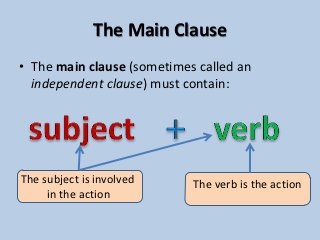A main clause is a clause that contains a subject and an object. Main clauses make sense on their own. ‘I like bananas. ‘ is a simple sentence which is made up of a main clause.
What is main clause and examples?
A main clause is a clause that contains a subject and an object. Main clauses make sense on their own. ‘I like bananas. ‘ is a simple sentence which is made up of a main clause.
What is a main clause meaning?
A main clause is a group of words that contains a subject and a verb and can form a complete sentence on its own.
What does main clause in a sentence mean?
What is a main clause? A main clause (also known as an independent clause) is one that can stand alone as a sentence in its own right. It must contain a subject and a verb.
How do you identify a main clause?
Main clauses have a subject and verb and can stand on their own. Subordinate clauses begin with a conjunction and therefore cannot stand on their own.
What is the main sentence?
A sentence must contain a main clause, which is typically made up of a subject and a verb, and it may also contain an object or a complement. A main clause may also be linked to another clause by a conjunction. Sentences can be classified according to their structure.
What are the types of main clause?
There are four basic types of main clause: declaratives (statements), interrogatives (questions), imperatives (orders/instructions) and exclamatives (used for exclamations).
What is main clause and subordinate clause?
A main clause is a clause that makes sense on its own and can also exist in a sentence on its own. A Subordinate clause is a clause that does not make sense on its own and cannot be a sentence on its own. The subordinate clause explains or completes the meaning in the main class.
What is main and dependent clause?
There are two types of clauses: dependent and independent. A dependent (subordinate) clause is an incomplete thought that cannot stand alone as a sentence. An independent (main) clause is a complete thought that can stand alone as a sentence.
What is a subordinate clause example?
Definition of subordinate clause : a clause that does not form a simple sentence by itself and that is connected to the main clause of a sentence In the sentence “I went home because I felt ill,” “because I felt ill” is a subordinate clause.
What are the 3 types of clause?
Relative Clause. There are three main types of dependent clauses: relative, noun, and adverbial. A relative clause is an adjective clause that describes the noun.
What are the main features of a clause?
In language, a clause is a constituent that comprises a semantic predicand (expressed or not) and a semantic predicate. A typical clause consists of a subject and a syntactic predicate, the latter typically a verb phrase composed of a verb with any objects and other modifiers.
What are the 3 types of clause?
Relative Clause. There are three main types of dependent clauses: relative, noun, and adverbial. A relative clause is an adjective clause that describes the noun.
What are the types of main clause?
There are four basic types of main clause: declaratives (statements), interrogatives (questions), imperatives (orders/instructions) and exclamatives (used for exclamations).
What are the two main types of clauses?
An independent clause, along with having a subject and verb, expresses a complete thought and can stand alone as a coherent sentence. In contrast, a subordinate or dependent clause does not express a complete thought and therefore is not a sentence.
What is the another name of main clause?
Main-clause definition Independent clause. (grammar) A clause that can stand alone syntactically as a complete sentence and contains at least a subject and a verb. Attributive form of main clause, noun.
Is a clause a sentence?
A clause is a group of words that contains both a subject and a predicate. Although a clause can sometimes act as a sentence since it contains both a subject and a verb, it is not necessarily a complete sentence. That is to say; not every clause is a complete sentence.
What are word clauses?
A clause is a group of words that contains a subject and a verb that have a relationship. This relationship is crucial; a clause conveys information about what that subject is or is doing, rather than simply being a random grouping of words.
How do you identify types of clauses?
Clauses come in four types: main (or independent), subordinate (or dependent), adjective (or relative), and noun. Every clause has at least one subject and one verb. Other characteristics will help you distinguish one type of clause from another.
What are the 2 types of clauses?
An independent clause, along with having a subject and verb, expresses a complete thought and can stand alone as a coherent sentence. In contrast, a subordinate or dependent clause does not express a complete thought and therefore is not a sentence.
How do you use clauses?
A clause is the basic building block of a sentence; by definition, it must contain a subject and a verb. Although they appear simple, clauses can function in complex ways in English grammar. A clause can function as a simple sentence, or it may be joined to other clauses with conjunctions to form complex sentences.
How do you make a clause in a sentence?
A clause must contain a verb. Typically a clause is made up of a subject, a verb phrase and, sometimes, a complement: I’ve eaten. The sale starts at 9 am.









